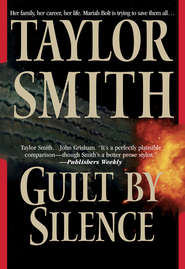По всем вопросам обращайтесь на: info@litportal.ru
(©) 2003-2024.
✖
Deadly Grace
Автор
Год написания книги
2018
Настройки чтения
Размер шрифта
Высота строк
Поля
“Oh, right. Anyway, that’s about it. Joe’s folks sent for Grace and the baby after the war, invited them to come and live here in Havenwood with them.”
“And Mrs. Meade never remarried?”
Berglund shook his head.
“You sure know a lot about the family’s history,” Cruz noted.
“Everybody in Havenwood knows that story. Joe Meade’s a local war hero. My kids go to Joseph Meade Elementary School. So did I, for that matter. As for Grace, well, she made her own mark on the town. It can’t have been easy for her, I guess, leaving everything and everyone she knew and coming out here to live. But by the time she died, there wasn’t a thing went on here she didn’t have a hand in. Ran half the town, for that matter. Her funeral’s probably going to be the biggest one the town’s ever seen. I can’t imagine many who won’t be there.”
Except her daughter, Cruz thought.
Muffled voices sounded behind the glassed-in reception area, and they looked over to see an older woman speaking to the orderly.
“This must be the psychiatrist,” Berglund said, pushing himself off the window ledge.
Cruz had to agree. The woman wore no white coat, just a long, belted navy cardigan and slacks, but there was no mistaking the authoritative bearing of someone used to having her way. Sure enough, the orderly nodded in the direction of the two men in the waiting room. The woman disappeared behind a partition, then reappeared, frowning and pushing her way though the heavy door that separated the waiting area from the ward beyond.
Tall and heavyset, she had frizzled, steel-gray hair coiled in a knot on top of her head.A pair of gold-rimmed eyeglasses dangled from a chain slung around the collar of the brightly colored blouse she wore under the navy cardigan, a riotous Rorschach test pattern of pinks, white and oranges. As she strode toward them, hands jammed in the pockets of her sweater, the crepe soles of her brown Hush Puppies squeaked on the tiled floor.
“I’m Dr. Helen Kandinsky. What can I do for you gentlemen?”
Her irritable expression put Cruz in mind of Miss Nugent, his junior high English teacher, whose habit it was to send all the “Mexicans” in her classes to seats at the back of the room. They could do what they wanted back there, she said, as long as they kept quiet, because she had no intention of wasting her time on bean pickers. Somewhere in America, people were marching for civil rights, but Miss Nugent obviously hadn’t heard the news. The fact that Cruz’s family had been in California nearly two hundred years cut no ice with her, either. No amount of effort ever earned him more than the standard “C” she handed out to every student with a Spanish-sounding last name, the minimum required to ensure that there would be no repeat appearances in her class.
Berglund introduced himself and Cruz, explaining why they were there. The doctor pulled her hands out of her pockets to shake theirs in turn. When she turned her clear-eyed gaze on Cruz, she held on to his hand for an extended moment, her expression softening, less irritated now than curious. In that split second, Cruz saw Miss Nugent slink away into that dank mental corner where all his anger and self-doubt lived and festered.
“An FBI agent?” she said. “I can see why the deputy here would need to speak to my patient, but why would you people be taking an interest in a local tragedy like this?”
“I’m working on another case where Miss Meade may be a material witness,” he told her. “I’d been trying to track her down in Washington, and when I heard what had happened here, I decided to fly out.”
“I see. Well, I’m sorry to say you’ve probably made a trip for nothing. I doubt Jillian’s going to be in a position to answer your questions anytime soon. I’m trying to get her to open up and talk about what happened to her mother, but it’s slow going, and I think it could take a while.”
“Has she said anything at all about what happened that night?” Berglund asked.
“She hasn’t uttered a single word since being brought in, not about that or anything else. Mind you, she was heavily sedated for the first twenty-four hours. I’ve backed her off the meds today, but she’s still largely unresponsive. She seems to be in shock.”
“She hasn’t tried…you know, to hurt herself again or anything, has she?” Berglund asked.
“No. We’re monitoring her very closely, mind you, but she’s been quiet. Too quiet, in fact. I’m getting concerned about the fact that she’s not eating or drinking. If she doesn’t start taking something in the next few hours, I may have to put her on an intravenous line. I’m hoping to avoid that, because it’s bound to upset her. If she resists and has to be restrained, physically or chemically, then we’re going to end up right back at square one.”
“Are you saying she has made some progress since coming in?” Cruz asked.
“Maybe just a little. She was completely unresponsive at first. A lot of that was the drugs, of course. And while she still hasn’t spoken, she has taken a tentative step out of her self-isolation.”
“How so?”
“I was in to see her a little while ago. She’s still not talking, but she’s listening, I can tell. I left her with a notebook and some markers. It seemed like a worthwhile gambit. I was told she’s a historian by profession and that she’s written for publication. Some writers can’t resist a blank page.”
“And that worked?”
The doctor nodded. “I think so. Sure enough, when I peeked in on her just a few minutes ago, she was writing feverishly. It’s very strange. It almost looks as if she were undergoing some kind of exorcism. Frankly, though, it’s an encouraging sign. Something is bothering her deeply, and she’s trying to communicate in the way she’s most comfortable. If that’s all she can manage for now, it’s fine with me.”
“So, what’s she writing?” Cruz asked.
Dr. Kandinsky’s lower lip jutted as she lifted her shoulders in a shrug. “I have no idea.”
“You haven’t read it?”
“No, I promised her privacy.”
“Then how do you know she’s not writing gibberish?”
“I don’t. But even if she is, it says something about her mental state. In the meantime, as long as she’s involved in some kind of external activity, she’s not trying to kill herself.”
“I’d like to try talking to her, Doctor,” Berglund said. “She and I…” He hesitated. “Jillian’s known me her whole life, that’s all, and she could probably use a familiar face right about now.”
The doctor studied him for a moment as she considered the request, but then shook her head. “I’m sorry, I have to say no. Not today, anyway. She’s at a very tricky juncture right now. She’s been severely traumatized, and in my professional opinion, she’s right on the cusp of total withdrawal.” Berglund started to protest but she held up a hand. “I have no doubt you mean well, Deputy, but to walk in now, wearing that uniform and asking questions about the fire and her mother’s death…well, it’s premature, I’m afraid.”
Berglund nodded, obviously resigned to wait, but Cruz shifted his weight from one foot to the other.
“With all due respect, Doctor, I’m a little skeptical about how traumatized she really is. There’s some evidence Miss Meade may have pertinent knowledge on at least two other recent homicides—and her mother was murdered, by the way, in case you weren’t aware.”
“Is that true?” Dr. Kandinsky asked, turning to Berglund. He nodded.
“So that being the case,” Cruz went on, “I think we need to consider the possibility that she could be faking these symptoms of hers.”
“She wanted to die in that fire,” Berglund said. “I know. I was there. I practically had to coldcock her before I could carry her out of there.”
“And then there was the second suicide attempt in the Havenwood ER,” Dr. Kandinsky pointed out.
“Conveniently unsuccessful once more,” Cruz said. “Look, you have to admit, Doctor, there are clever people who sometimes act crazy in order to throw up a smoke screen to cover their actions. I know—I’ve seen it before.”
“I’m not saying it’s impossible, but I doubt it, in this case. And if you’re wrong and we push her too hard prematurely, Agent Cruz, we could very well do permanent damage. She could shut down for good, and then she might well succeed at her next attempt at suicide. Because make no mistake about it, gentlemen, the opportunity will arise sooner or later, and that wouldn’t suit your purposes or mine.”
Cruz was ready to argue it further, but her fighter’s stance and the shake of her gray head made it clear she was not about to back down.
“No. You can come back tomorrow and we’ll see where we’re at then. For now, my medical order stands—Jillian Meade is not to be disturbed. You can try for a court order, if you want, but I warn you, I’ll oppose it vigorously.”
Cruz would have been willing to take his chances with a judge, but Berglund’s set expression told him he’d be on his own. “One more day isn’t going to make any difference,” the deputy said. “We’ll wait.”
Kandinsky nodded. “I think that’s the best course.”
“Could we at least see her?” Berglund asked.
“I suppose that would be all right. I don’t see what harm it would do for you simply to look at her—from a distance, you understand. There’s a one-way observation window in her room. You can see her from there.”
They followed her over to the solid steel door next to the reception window and waited while the orderly at the desk buzzed them through. Dr. Kandinsky led them past a large common room just behind the reception desk, where eight or ten people in robes and hospital gowns, elderly for the most part, were sitting around card tables, or in recliners or wheel-chairs arranged in a circle in front of a television set.
“Our geriatric cases,” the doctor told them. “Dementia, mostly. We give them a little occupational therapy, but there’s not much potential for happy endings there.”











